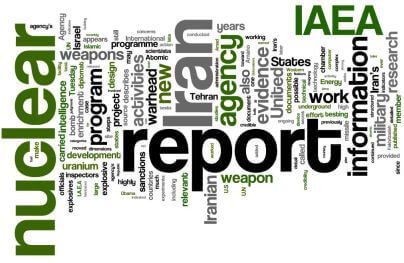 Everything you need to know about today’s coverage of Israel and the Mideast.
Everything you need to know about today’s coverage of Israel and the Mideast.
The IAEA’s report on Iran dominated the news, practically overshadowing the Palestinians conceding they can’t push statehood through the UN Security Council.
Iranian Atomic Urgency
• The NY Times posted on its web site a copy of the much-anticipated IAEA report (pdf) on Iran’s nuclear program. According to the NYT:
The long-awaited report relies on evidence whose scope and depth is far greater than any the agency has made public before, and represents the harshest judgment that the International Atomic Energy Agency has ever issued in its decade-long struggle to pierce the secrecy surrounding the Iranian program . . .
The report offered no estimate of how long it would take for Iran to be able to produce a nuclear weapon. But it laid out the case that Iran had moved far beyond the blackboard to create computer models of nuclear explosions in 2008 and 2009 and conducted experiments on nuclear triggers. The report said that starting in 2000, the Iranians constructed a vessel to conduct those tests, which was not shown to inspectors who visited the site five years later.
Those tests “are strong indicators of possible weapon development,” it said.
• Despite all that, it’s business as usual at Turtle Bay. Reuters/JPost says strong UN sanctions are still unlikely with the mullahs continuing to get diplomatic cover from Russia and China.
• Here’s a word cloud of five randomly chosen news articles I made for illustrative purposes; if you use it to read tea leaves, do so at your own risk.

• The Gulf states quietly support an attack on Iran, but worry about being branded as collaborating with the country whose name begins with an I and rhymes with Fizreal.
None of these states want to be the one that openly allowed the Israelis to have overflight rights.
“At the end of the day the Iraq coalition of Arab states was relatively easy despite the posturing. This time . . . though most of these states want to see an attack, the danger is being branded a traitor and siding with the Zionist entity” he said. “These states travel in herds, in packs – when one breaks, the others feel more comfortable breaking as well.
“I suspect we’ll see a quiet, almost invisible coalition that provides any assistance Israel needs but in such a way that provides them cover and plausible deniability,” Schanzer said.
• Analysts tell Dan Williams (Reuters) that Israel could successfully mount pinpoint raids on Iran. How the escalation unfolds is the messy part; Col. Richard Kemp states the obvious:
“Israel knows that an attack on Iran, no matter how much evidence to show that Iran is on the cusp of acquiring nuclear weapons that could kill large numbers of Israelis if it chooses, would cause an international outcry,” said Richard Kemp, a retired British army colonel who has studied Israeli doctrines.
“It is very much in Israel’s interest to take every possible precaution to make it as precise and effective as possible (and) do everything to avoid unnecessary civilian casualties.”
• David Rothkopf (Foreign Policy): Don’t rule out Obama ordering an attack on Iran, and don’t expect relations with Israel to improve despite the action:
Finally, the Israelis are wrong if they think that U.S. cooperation on this issue will restore the bond between the two nations. They may work side-by-side on this as they did on the Stuxnet intervention. They share close ties. But so long as Israel pursues settlements and other policies that inflame the Palestinian situation and make a solution less likely, this administration will be more divided internally in its views on Israel than its public statements may suggest. Further, the reality is that history is moving against the Israelis. Not only are America’s strategic priorities shifting — the end of the Cold War and the War on Terror were both blows to the “indispensability” of Israel to the U.S. — but other countries, like China and India, are gaining more influence in the region as they become more important consumers of the region’s oil.
• See more commentary/analysis by Jeffrey Goldberg, Arnaud de Borchgrave and Bloomberg News.
Peace Process
![]() • The Times of London (staff-ed) weighs in on the Obama/Sarkozy open mic night in Cannes:
• The Times of London (staff-ed) weighs in on the Obama/Sarkozy open mic night in Cannes:
What the conversation in Cannes shows is that, in Mr Netanyahu, Israel seems to have the wrong leader at the wrong time. This newspaper hopes that either he can change, or if not, that he can be changed.
Ouch.
• More reax on the Obama/Sarko gaffe from Elliott Abrams, Jackson Diehl, Michael Bell and Karl Vick.
 • The Palestinians conceded to AP they don’t have enough support in the Security Council for statehood. The NY Times explains how the state will die in committee — for now:
• The Palestinians conceded to AP they don’t have enough support in the Security Council for statehood. The NY Times explains how the state will die in committee — for now:
The four-page report, drafted by Portugal, said the Council members held three broad views on the issue, without going into details. (Each Council member gets a seat on the membership committee, and Portugal, as the current Council president, is the chair.) . . .
Although changes could still be made in the draft report, the Security Council is expected to accept the report by consensus on Friday, a kind of “we agree to disagree” outcome. If no nation submits a resolution demanding a formal vote on the issue, none will be taken.
• This headline says a lot about how much has changed since the Rabin assassination 16 years ago. I found Sheera Frenkel’s dispatch sobering:
As peace hopes fade, so do Israel’s memories of Yitzhak Rabin
Arab Spring
• While everyone was preoccupied with Palestinian statehood and Iranian nukes, Jordan’s trying rapprochement with Hamas. Jonathan Schanzer says playing to the people is an Arab Spring thing.
• UN numbers put the Syrian death toll at 3,500. That’s double the inflated Palestinian civilian casualty figures for Operation Cast Lead. More at the LA Times.
• The Lede rounds up the latest videos from the besieged Syrian city of Homs. This one shows an army sniper firing from a rooftop.
Rest O’ the Roundup
• The Washington Post ombudsman weighs in on Jennifer Rubin’s controversy. It was triggered by Gilad Shalit-related tweet, but as I blogged earlier today, the real issues are
- The distinction between news and opinion.
- How much journalists on Twitter reflect on the papers they work for.
- The legitimacy of web activism in mobilizing letters to the editor.
It started with this tweet by Rachel Abrams, which Rubin retweeted to her 7,000+ followers . . .
• I was impressed with this LA Times commentary by Nicholas Goldberg. His son was born in Jerusalem, and his US passport doesn’t say “Jerusalem, Israel.”
For my son — when the news of the Zivotofsky case was broadcast on NPR during carpool — it served, I hope, as a reminder of his place in the broader world, and of the way in which one’s personal story can be distantly connected to a giant, raging battle on the other side of the planet. For me and my wife, it was another reminder of the battered, disputed city we once lived in . . .
• Speaking of the Supreme Court, the justices are looking into an unusual case: the family of Azzam Rahim, a Palestinian with US citizenship tortured to death in a PA prison in 1995 is pursuing legal action against the PLO. Daled Amos sums up the case and rounds up the relevant links.
• Where else but in The Guardian‘s Comment is Free section would you find someone like Duncan Campbell equating Mordechai Vanunu with Gilad Shalit?

The moving sight of Shalit being welcomed home and of Palestinian prisoners returning to their families in Gaza and the West Bank should be mirrored now with a picture of Vanunu, a man who has already paid a very heavy price for his principles, walking down to the steps of a plane and on to the tarmac of a country when he is not vilified and threatened.
Shalit was passively kidnapped by Hamas while Vanunu proactively gave classified nuclear info to a foreign reporter. I wonder if Campbell ever called called for Shalit’s freedom as emphatically . . .
• Worth reading: Gilad Shalit and the Rising Price of an Israeli Life
• The Daily Star wonders: Has Hezbollah has cracked the DNA of Israel’s drones.
• Israel has completed 65 km of its border fence with Egypt. More at the JPost. And if you don’t know what Robert Frost would say . . .


